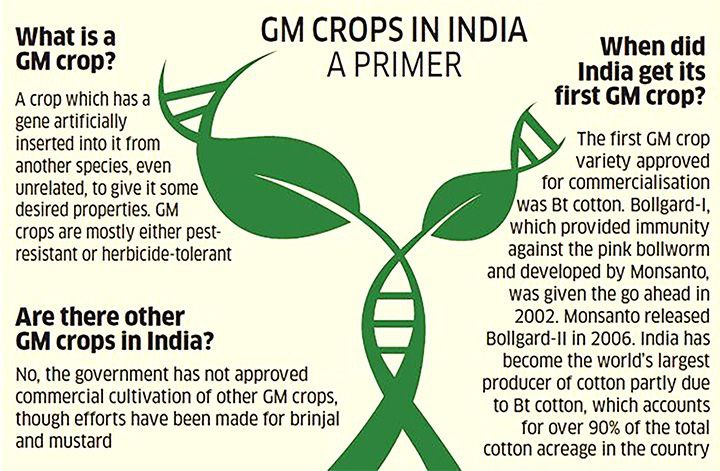
The status of transgenic crops in India
Gujarat, Maharashtra and Telangana have deferred a proposal approved by the Centre's Genetic Engineering Appraisal Committee (GEAC) to test a new kind of transgenic cotton seed that contains a gene, Cry2Ai, that purportedly makes cotton resistant to pink bollworm.
The status of transgenic crops in India
• Story?
Gujarat, Maharashtra and Telangana have deferred a proposal approved by the Centre's Genetic Engineering Appraisal Committee (GEAC) to test a new kind of transgenic cotton seed that contains a gene, Cry2Ai, that purportedly makes cotton resistant to pink bollworm.
• What is the status of transgenic crops in India?
There are an array of crops– brinjal, tomato, maize, chickpea– in various stages of trials that employ transgenic technology.
However, cotton is the only crop that is being commercially cultivated in India.
The GEAC had approved the environmental release of Mustard hybrid DMH-11 in 2022 for seed production and testing. This is one step away from full commercial cultivation.
However, the GEAC isn't the final arbiter in case of GM crops. There is a long-standing litigation in Supreme Court on the permissibilty of transgenic food crops.
• What is the process of regulating transgenic crops in India?
The process is an elaborate one as inserting transgenic genes into plants to elicit a sustained, protective response is a mix of both science and chance.
Mutliple safety assessments are done before they are cleared for further tests in open lands. A transgenic plant can apply for commercial clearance only after it has proven to be better than comparable non-GM variants on claimed parameters (for instance, drought tolerance or insect resistance). Open field trials often take place over multiple crop seasons, and types of geographical conditions to assess its sustainability across states.
• GEAC- is the apex technical body charged with evaluating proposals for testing GM organisms
• it consists of a panel of plant biotechnologists; is headed by a senior official of the Environment Ministry and co-chaired by the scientist of the DBT
•GM foods are derived from plants whose genes are artificially modified, usually by inserting genetic material from another organism, in order to give it a new property, such as increased yield, tolerance to a herbicide, resistance to disease or drought, or to improve its nutritional value.
